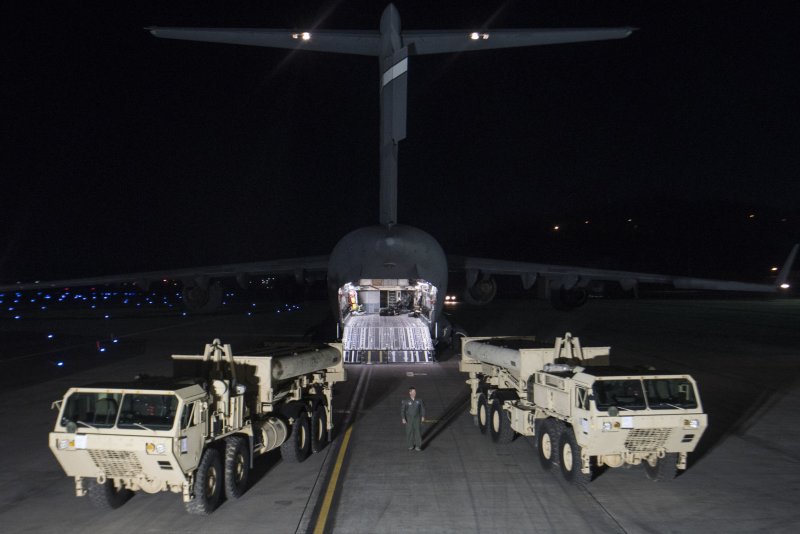Seoul said the missile defense system THAAD has “initial operational capabilities,” a week after a battery was deployed to its designated site in central South Korea. File Photo by U.S. Air Force/UPI |
License Photo
May 2 (UPI) -- The U.S. missile defense system THAAD is operational in South Korea and ready to strike down incoming North Korea missiles, Seoul's defense ministry said Tuesday.
But the announcement comes at a time when more South Korean activists are calling for a review of THAAD's hasty deployment last week, and after remarks from U.S. President Donald Trump suggesting a review of burden-sharing arrangements riled South Koreans.
Yonhap reported Tuesday Seoul's defense ministry spokesman Moon Sang-kyun confirmed previous statements regarding THAAD.
Moon said that he is able to "confirm the equipment currently deployed can be used to demonstrate initial [operational] capabilities with regards to North Korea's nuclear and missile threats."
The defense ministry also said there would be no renegotiation of THAAD payments, a statement that was earlier reaffirmed by U.S. National Security Adviser Gen. H.R. McMaster on Sunday.
"What I told our South Korean counterpart is until any renegotiation, that the deal's in place, we'll adhere to our word," McMaster had said.
A report for South Korean television network JTBC, however, points out the cost-sharing agreement on THAAD could change if it becomes combined with other issues.
THAAD deployment is currently itemized as a cost of maintaining U.S. troops on the peninsula, which is covered by the U.S. Army per Article V of the Status of Forces Agreement with Korea.
But if THAAD is re-itemized as a "separate weapon for the defense of the Korean peninsula," that agreement could change, according to the South Korean press report.
Some analysts in Seoul have recommended alternative solutions, including a more independent deployment of the same missile defense that could also mitigate Chinese concern of U.S. surveillance, local newspaper Munhwa Ilbo reported Tuesday.
The THAAD system costs up to $1 billion, a number Trump mentioned in his comments last week.
Beijing issued a warning again on Tuesday and said "necessary measures" could be taken in response to THAAD, according to Yonhap.















